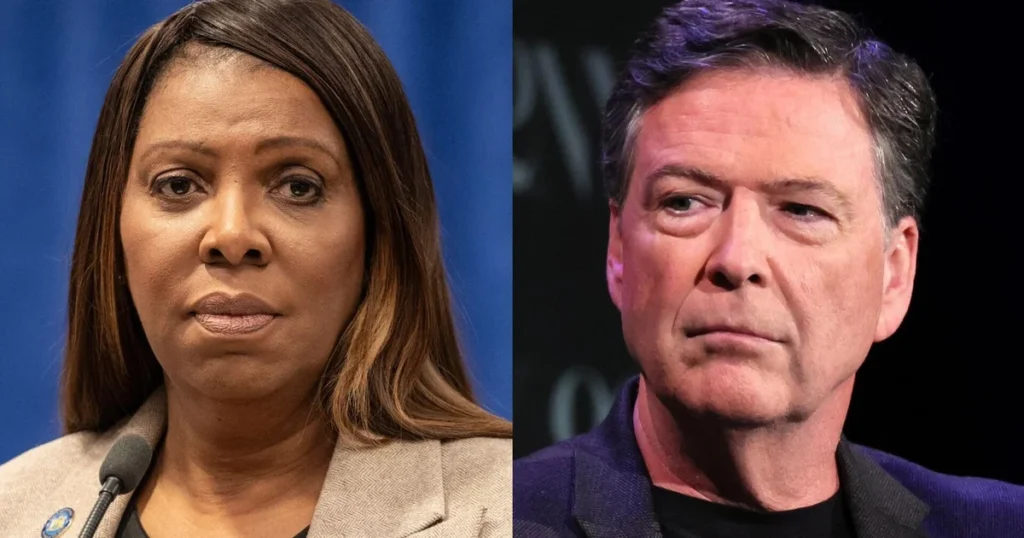In a significant shake-up within the U.S. Attorney’s Office for the Eastern District of Virginia, prosecutor Maggie Cleary has been removed from her position, revealing ongoing turbulence in a key office that is handling high-profile cases, including charges against notable political figures. Cleary, who had briefly assumed leadership of the office, is the latest in a series of departures that may indicate deeper issues within the Justice Department as it navigates politically sensitive territory. This latest news coincides with the recent resignation of former acting U.S. Attorney Erik Siebert and ongoing investigations that have drawn the attention of the White House.
| Article Subheadings |
|---|
| 1) Overview of Recent Changes in the Eastern District |
| 2) Implications of Cleary’s Removal |
| 3) Context of the Ongoing Investigations |
| 4) Reactions Among Law Enforcement and Politicians |
| 5) Future Outlook for the U.S. Attorney’s Office |
Overview of Recent Changes in the Eastern District
The Eastern District of Virginia has been undergoing substantial leadership changes, leading to widespread speculation about the motivations behind such upheaval. Maggie Cleary had only just taken over the office after the resignation of Erik Siebert, who left amid internal concerns regarding the prosecution of high-profile cases. The office is known for its dual focus on national security and federal law enforcement and remains one of the largest prosecutor’s offices in the United States. Such rapid changes in leadership often signal unrest or dissatisfaction with current policies and strategies, especially given the sensitive nature of the cases being handled.
Implications of Cleary’s Removal
The removal of Maggie Cleary leaves questions about the direction of the Eastern District’s operations. While it remains unclear whether she was completely removed from the Justice Department or reassigned, her exit can be viewed as indicative of larger organizational issues. Just days after her announcement of replacing Erik Siebert, Lindsey Halligan, a former aide in the White House, took control as the interim U.S. Attorney, effectively undermining Cleary’s role. Such shifts indicate a potential politicization of the office and may influence how cases are pursued or managed moving forward.
Context of the Ongoing Investigations
The Eastern District has been under scrutiny for its recent charges against notable figures, including former FBI Director James Comey. The office has focused on investigations that some perceive as closely tied to political dynamics, causing its integrity to be questioned. These cases are not merely legal actions but also serve as a battleground for political narratives, especially as President Donald Trump has publicly pushed for investigations into political rivals such as Comey and Letitia James, the New York Attorney General. The intertwining of political motivations with prosecutorial decisions raises concerns about independence within the judicial system.
Reactions Among Law Enforcement and Politicians
Reactions from both colleagues within the Justice Department and political observers have been mixed, with discontent evident among those who have been removed or reassigned. Following his dismissal, Michael Ben’Ary, another federal prosecutor, expressed concerns that his exit could negatively impact critical national security cases. The letter he circulated detailed his disappointment in leaving behind important work and reflected a broader sense of unease among staff about the changes occurring within the office. The political implications of these legal actions lead to broader discussions about the health of democracy and the non-partisan nature of justice enforcement.
Future Outlook for the U.S. Attorney’s Office
The outlook for the U.S. Attorney’s Office for the Eastern District of Virginia remains uncertain in light of these developments. With the recent resignations and firings, the continuity in leadership and strategic direction has come into question. The office’s ability to function effectively and independently while handling not just political cases but also critical national security issues may be compromised by recent political apps and interventions. As investigations progress, both the public and legal observers will be closely monitoring how these changes may affect law enforcement actions and the overarching respect for the rule of law.
| No. | Key Points |
|---|---|
| 1 | Maggie Cleary has been removed from her position in the Eastern District of Virginia. |
| 2 | Lindsey Halligan has taken over as interim U.S. Attorney. |
| 3 | Cleary’s removal raises questions about political interference in the justice process. |
| 4 | The Eastern District is handling critical federal cases, including charges against political figures. |
| 5 | Concerns are mounting about the office’s integrity and future operations amid these changes. |
Summary
The recent leadership changes in the Eastern District of Virginia reflect broader issues of political influence within the Justice Department. The removal of key figures like Maggie Cleary and Erik Siebert resonates not only through the legal community but also in discussions about the integrity of federal institutions. As the district grapples with ongoing investigations and sensitive public cases, the future dynamics of prosecutorial actions remain a pressing concern for advocates of justice and political neutrality.
Frequently Asked Questions
Question: What led to Maggie Cleary’s removal from the U.S. Attorney’s Office?
Maggie Cleary was removed amid significant changes in leadership within the Eastern District of Virginia, raising concerns about internal conflicts and potential political motivations.
Question: Who is currently serving as the interim U.S. Attorney?
Lindsey Halligan has been sworn in as the interim U.S. Attorney, effectively taking over control of the office after Cleary’s removal.
Question: What are the broader implications of these changes for the Justice Department?
The changes indicate a troubling trend of political influence over prosecutorial decisions, which could compromise the independence and functioning of the Justice Department moving forward.
